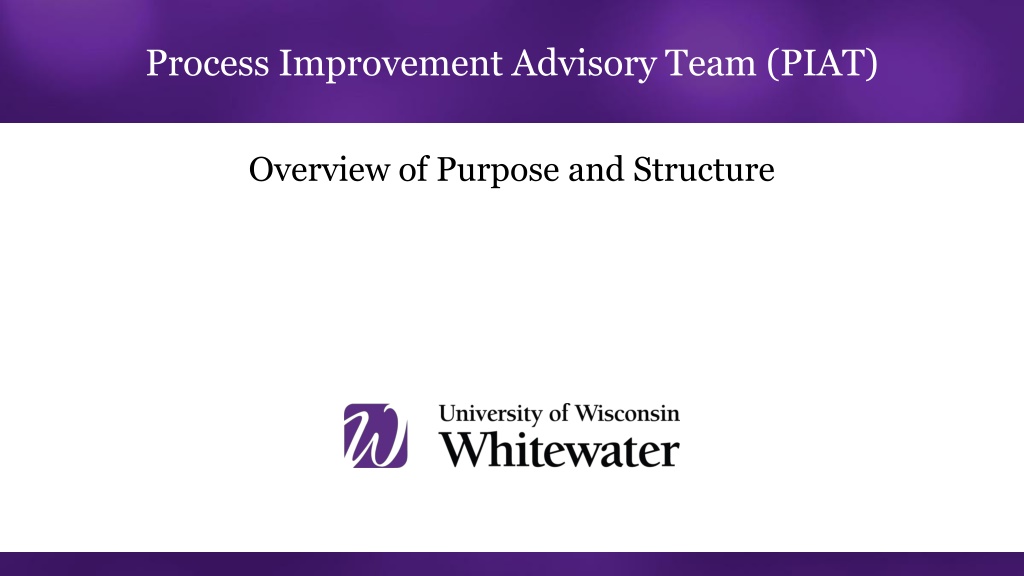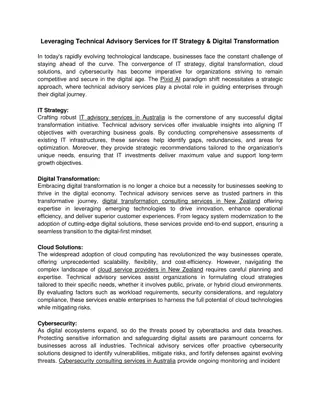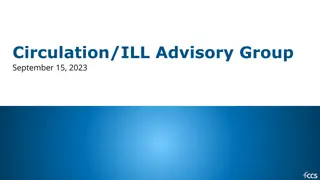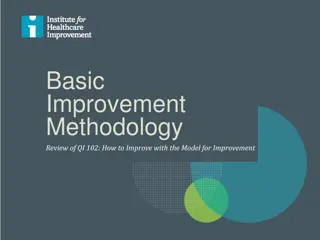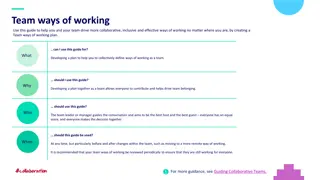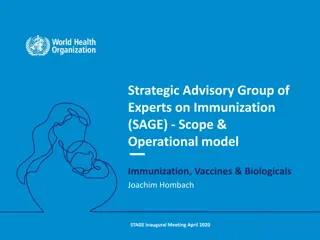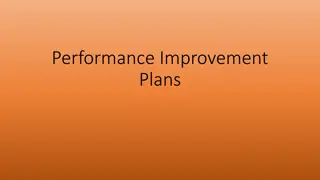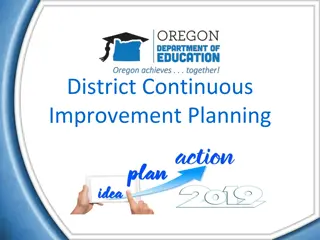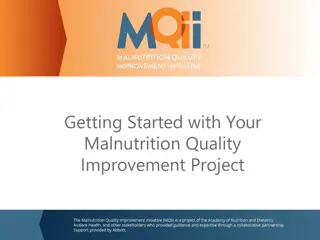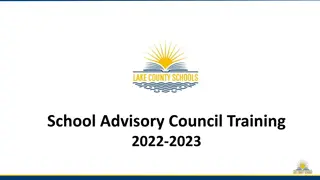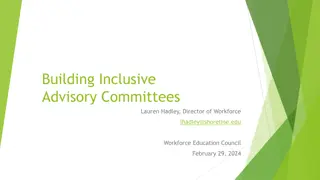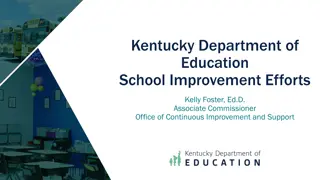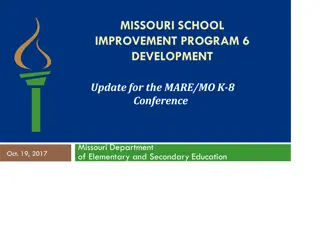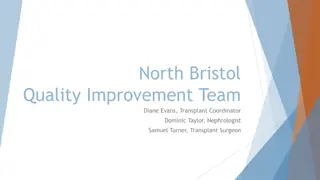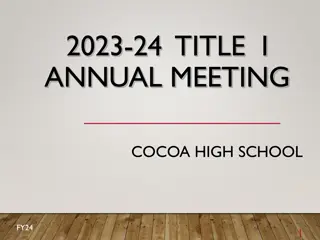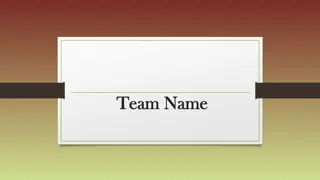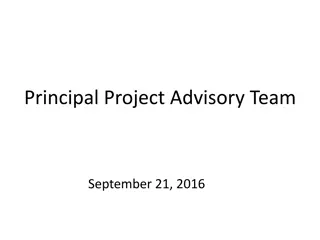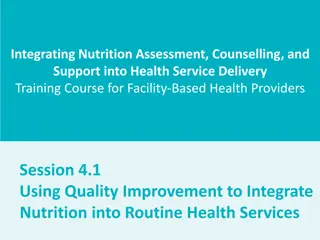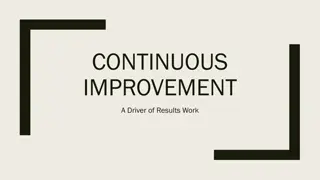Process Improvement Advisory Team (PIAT)
The Process Improvement Advisory Team (PIAT) at the campus focuses on operational efficiency, cost containment, and sustainability through various projects. By optimizing collaborations and implementing changes, PIAT plays a crucial role in achieving organizational success and excellence. The team's accomplishments include significant cost savings in fleet management, sustainability initiatives, and the creation of animated training videos. The evolution and updated structure of PIAT aim to enhance project work and collaboration within the campus community.
Uploaded on Feb 18, 2025 | 0 Views
Download Presentation

Please find below an Image/Link to download the presentation.
The content on the website is provided AS IS for your information and personal use only. It may not be sold, licensed, or shared on other websites without obtaining consent from the author.If you encounter any issues during the download, it is possible that the publisher has removed the file from their server.
You are allowed to download the files provided on this website for personal or commercial use, subject to the condition that they are used lawfully. All files are the property of their respective owners.
The content on the website is provided AS IS for your information and personal use only. It may not be sold, licensed, or shared on other websites without obtaining consent from the author.
E N D
Presentation Transcript
Process Improvement Advisory Team (PIAT) Overview of Purpose and Structure
Background Information What is PIAT? Incremental change program, focused on operational excellence, efficiencies, and cost containment achieved through improvement projects. Why is PIAT so important? Helps the campus identify opportunities for operational excellence, and organizational success. Optimize collaborations Research projects and develop reports Share observations Assess findings Contribute feedback Make recommendations to the Vice Chancellor of Administrative Affairs Implement changes in accordance with Chancellor s Cabinet determinations
Top 3 Accomplishments to Date Fleet Management and Transportation System Our fleet management initiatives produce significant annual cost savings, improved operational efficiency, and reduced use of fossil fuels in support of campus sustainability efforts. Projects include reduction in our overall fleet size (parts, maintenance) and switching to shared, low speed, all-wheel vehicles with greater fuel efficiency. These efficiencies have enabled resources to support our shuttle service and larger Transportation System which contributes to students ease of access, and creates community connections for work and social opportunities. Total Savings: $243,000 Total Revenue: $545,266 Sustainability and Going Green Considerable efforts are being made to support Sustainability initiatives to better our campus community. From our new green cleaning products system and optimizing our waste bins strategy, to upcycling gently used furniture, removing deodorizers and determining an effective and efficient non-Glyphosate herbicide alternative that helps us eliminate weeds on campus UW-Whitewater is committed to being good stewards of our resources, land, and community. Total Savings: $400,000+ Training Videos Animated training videos are created with assistance from talented student assistants, who upload new content on a continuous basis to offer access to a variety of different informational topics including policies, compliance, processes, and initiatives. Out latest videos include guidance around Virtual Open Meetings Law, and a series highlighting key efforts of the Warhawks Return Plan. Creativity Bonus Points: Priceless!
PIAT Evolution & New Structure Original Framework Updated Framework Biweekly (once every two weeks, on Thursdays) Meetings open to any and all members of the campus community. Work Group will meet biweekly (once every two weeks, on Thursdays). Advisory Team will meet bimonthly (once every two months, on Thursdays). Project work and active collaboration will be the primary focus of the Work Group s meetings. Project work is sporadic, as it relies heavily on meeting attendance and those individuals availability to assist. Plan, Do, Check, Act Cycle is structured, with weekly goals and objectives more clearly defined. Plan, Do, Check, Act Cycle is intentionally flexible. Results will be communicated for all projects, even if they do not result in implementation. Results are communicated for projects that reach completion and implementation.
Program elements that are not changing Our Mission: To utilize a variety of project management practices to identify process improvement projects and implement continuous, incremental change. These changes can include savings of time and money across a variety of areas. We will address these changes to align with policy, compliance and general best practices. Open and Flexible Attendance: Any and all members of the campus community will continue to have the flexibility to attend meetings, offer feedback, and ask questions. These meetings are just happening less frequently (bimonthly - once every two months, on Thursdays), to adapt to changing operational needs. Collaboration: Subject Matter Experts (SMEs) will continue to play an important role in assisting with projects in the PIAT pipeline. Project requests, ideas, and opportunities are still highly encouraged and drive our processes forward.
Work Group Role The PIAT Work Group is a collaborative team that executes on process improvement projects to ensure a more streamlined approach to: identifying projects for consideration, articulating potential benefits and value (monetary and non-monetary) highlighting any associated risks, negative aspects, or other challenges, and developing summary observations and recommendations in support of incremental change, efficiencies (saving time and/or money), and satisfaction. The PIAT Work Group Team will hold biweekly meetings (once every two weeks on Thursday afternoons) to execute on project work such as research, connecting with SMEs, and gathering and analyzing data, as well as writing summary documents for the PIAT Advisory Team and Chancellor s Cabinet to review and assess. Involvement with SMEs across campus may vary depending on the project scope and objectives, however the Work Group will maintain the following standing, core individuals: TITLE Quality Assurance Improvement Manager Inventory Control Supervisor Sustainability Director Development Coordinator, CEC Manager Project Manager Faculty Member TBD* DEPARTMENT Administrative Affairs Facilities Planning & Management Facilities Planning & Management Human Resources & Diversity University Marketing & Communications Academic Unit TBD*
Advisory Team Role The PIAT Advisory Team will attend bimonthly meetings (once every two months on Thursday afternoons) with the Work Group Team to provide feedback on projects. The Advisory Team will have the opportunity to review project summaries, and advise of any questions, concerns, or other comments. The Advisory Team will encourage open membership, with flexible attendance, for all interested members of the Warhawk community. Those who are interested in learning more about PIAT are encouraged to visit the PIAT Website, and contact the Quality Assurance Improvement Manager at stokesa@uww.edu for any questions, concerns, or requests to join the mailing and calendar list.
Chancellors Cabinet Role The Vice Chancellor of Administrative Affairs will present PIAT project summaries to Chancellor s Cabinet for review. Chancellor s Cabinet can choose to request additional information, offer advice on next steps, or determine no further action is needed as projects are presented.
Draft PIAT Charter Defines how PIAT is organized, as well as its mission, and authority. Will remain in Draft format for one (1) year: Please review and provide feedback.
What else can I expect? Updated calendar invitations to reflect the Administration Team and Advisory Team structures. Updated website.
Questions? Alexandra Stokes Quality Assurance Improvement Manager and Records Custodian Email: stokesa@uww.edu Telephone: (262) 472-1772
